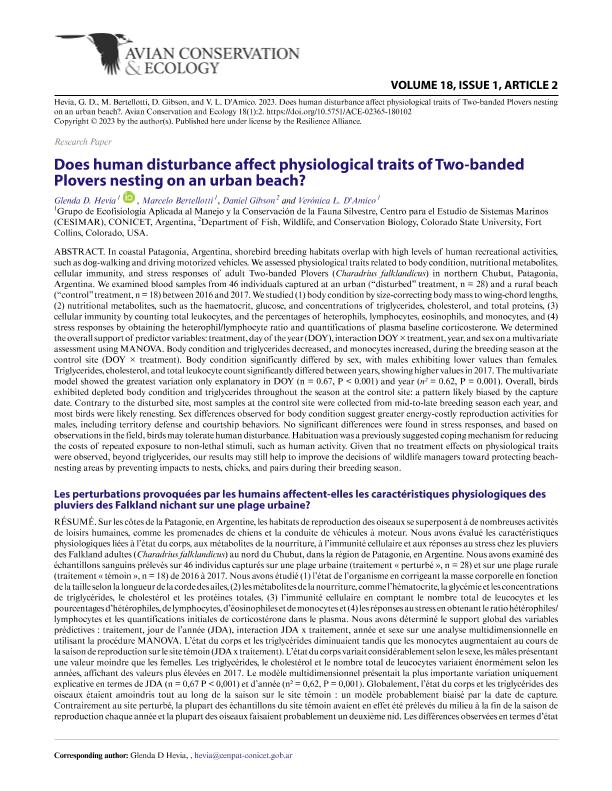Mostrar el registro sencillo del ítem
dc.contributor.author
Hevia, Glenda Denise

dc.contributor.author
Bertellotti, Néstor Marcelo

dc.contributor.author
Gibson, Daniel
dc.contributor.author
D'amico, Veronica Laura

dc.date.available
2024-04-18T13:17:18Z
dc.date.issued
2023-01
dc.identifier.citation
Hevia, Glenda Denise; Bertellotti, Néstor Marcelo; Gibson, Daniel; D'amico, Veronica Laura; Does human disturbance affect physiological traits of Two-banded Plovers nesting on an urban beach?; Resilience Alliance; Avian Conservation and Ecology; 18; 1; 1-2023; 1-15
dc.identifier.issn
1712-6568
dc.identifier.uri
http://hdl.handle.net/11336/233447
dc.description.abstract
In coastal Patagonia, Argentina, shorebird breeding habitats overlap with high levels of human recreational activities, such as dog-walking and driving motorized vehicles. We assessed physiological traits related to body condition, nutritional metabolites, cellular immunity, and stress responses of adult Two-banded Plovers (Charadrius falklandicus) in northern Chubut, Patagonia, Argentina. We examined blood samples from 46 individuals captured at an urban (?disturbed? treatment, n=28) and a rural beach (?control? treatment, n=18) between 2016-2017. We studied 1) body condition by size-correcting body mass to wing-chord lengths, 2) nutritional metabolites, such as the hematocrit, glucose, and concentrations of triglycerides, cholesterol, and total proteins, 3) cellular immunity by counting total leukocytes, and the percentages of heterophils, lymphocytes, eosinophils, and monocytes, and 4) stress responses by obtaining the heterophil/lymphocyte. ratio and quantifications of plasma baseline corticosterone. We determined the overall support of predictor. variables: treatment, day of the year (DOY), interaction DOY×treatment, year, and sex on a multivariate assessment using MANOVA. Body condition and triglycerides decreased, and monocytes increased, during the breeding season at the control site (DOY×treatment). Body condition significantly differed by sex, with males exhibiting lower values than females. Triglycerides, cholesterol, and total leukocyte count significantly differed between years, showing higher values in 2017. The multivariate model showed the greatest variation only explanatory in DOY (n =0.67, P < 0.001) and year (n2=0.62, P=0.001). Overall, birds exhibited depleted body condition and triglycerides throughout the season at the control site: a pattern likely biased by the capture date. Contrary to the disturbed site, most samples at the control site were collected from mid-to-late breeding season each year, and most birds were likely renesting. Sex differences observed for body condition suggest greater energy-costly reproduction activities for males, including territory defense and courtship behaviors. No significant differences were found in stress responses, and based on observations in the field, birds may ?tolerate? human disturbance. Habituation was a previously suggested coping mechanism for reducing the costs of repeated exposure to non-lethal stimuli, such as human activity. Given that no treatment effects on physiological traits were observed, beyond triglycerides, our results may still help to improve the decisions of wildlife managers toward protecting beach-nesting areas by preventing impacts to nests, chicks, and pairs during their breeding season.
dc.format
application/pdf
dc.language.iso
eng
dc.publisher
Resilience Alliance

dc.rights
info:eu-repo/semantics/openAccess
dc.rights.uri
https://creativecommons.org/licenses/by-nc-sa/2.5/ar/
dc.subject
BREEDING
dc.subject
SEASON
dc.subject
CONSERVATION
dc.subject
PHYSIOLOGY
dc.subject
HUMAN
dc.subject
ACTIVITIES
dc.subject
PATAGONIA
dc.subject
ARGENTINA
dc.subject
PHYSIOLOGICAL
dc.subject
PARAMETERS
dc.subject
SHOREBIRDS
dc.subject.classification
Ecología

dc.subject.classification
Ciencias Biológicas

dc.subject.classification
CIENCIAS NATURALES Y EXACTAS

dc.subject.classification
Biología Reproductiva

dc.subject.classification
Ciencias Biológicas

dc.subject.classification
CIENCIAS NATURALES Y EXACTAS

dc.subject.classification
Otros Tópicos Biológicos

dc.subject.classification
Ciencias Biológicas

dc.subject.classification
CIENCIAS NATURALES Y EXACTAS

dc.title
Does human disturbance affect physiological traits of Two-banded Plovers nesting on an urban beach?
dc.type
info:eu-repo/semantics/article
dc.type
info:ar-repo/semantics/artículo
dc.type
info:eu-repo/semantics/publishedVersion
dc.date.updated
2024-04-17T12:39:46Z
dc.journal.volume
18
dc.journal.number
1
dc.journal.pagination
1-15
dc.journal.pais
Canadá

dc.description.fil
Fil: Hevia, Glenda Denise. Consejo Nacional de Investigaciones Científicas y Técnicas. Centro Científico Tecnológico Conicet - Centro Nacional Patagónico. Centro para el Estudio de Sistemas Marinos; Argentina
dc.description.fil
Fil: Bertellotti, Néstor Marcelo. Consejo Nacional de Investigaciones Científicas y Técnicas. Centro Científico Tecnológico Conicet - Centro Nacional Patagónico. Centro para el Estudio de Sistemas Marinos; Argentina
dc.description.fil
Fil: Gibson, Daniel. University of Colorado; Estados Unidos
dc.description.fil
Fil: D'amico, Veronica Laura. Consejo Nacional de Investigaciones Científicas y Técnicas. Centro Científico Tecnológico Conicet - Centro Nacional Patagónico. Centro para el Estudio de Sistemas Marinos; Argentina
dc.journal.title
Avian Conservation and Ecology
dc.relation.alternativeid
info:eu-repo/semantics/altIdentifier/url/https://ace-eco.org/vol18/iss1/art2/
dc.relation.alternativeid
info:eu-repo/semantics/altIdentifier/doi/https://doi.org/10.5751/ACE-02365-180102
Archivos asociados
